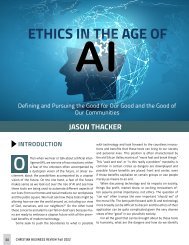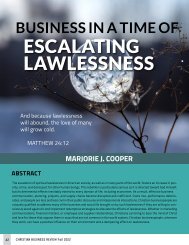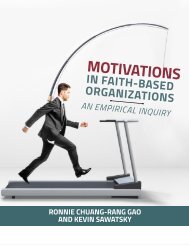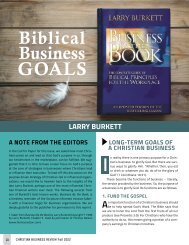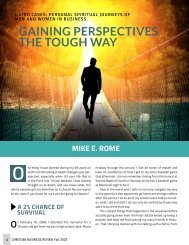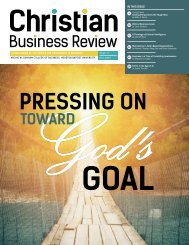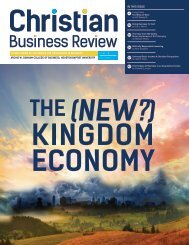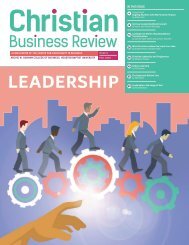Christian Business Review 2018: Kingdom Business in the Brave New World (Issue 7)
Create successful ePaper yourself
Turn your PDF publications into a flip-book with our unique Google optimized e-Paper software.
economics, privacy, and ethics<br />
CBR PEER REVIEWED ARTICLES<br />
CHRISTIANS SHOULD RESIST THE URGE TO LET<br />
PRIVACY RIGHTS REIGN SUPREME. THAT IS, IN THE<br />
ANONYMIZED COMMERCE ENABLED AND ENCOUR-<br />
AGED BY MODERN TECHNOLOGY, THERE COULD BE<br />
A REAL DANGER THAT WE LOSE THE ABILITY, MORES,<br />
AND DISCIPLINES NECESSARY TO PARTICIPATE IN A<br />
MORE PERSONAL ECONOMIC LIFE.<br />
ic <strong>in</strong>centive to protect privacy, elim<strong>in</strong>at<strong>in</strong>g <strong>the</strong> long-run<br />
<strong>in</strong>centive to monetize consumer data.<br />
What <strong>the</strong>n, is <strong>the</strong> place of a <strong>Christian</strong> ethic of openness<br />
<strong>in</strong> a global economy? Let me offer two suggestions.<br />
First, our global technological economy is busy shap<strong>in</strong>g<br />
our culture, and right now that is a culture that lauds privacy<br />
and zealously protects <strong>the</strong> space that is “personal.”<br />
But our economy is not made up entirely of “modern”<br />
transactions. To <strong>the</strong> extent that <strong>the</strong>re is a place for relationship-centered<br />
commerce, <strong>Christian</strong>s should resist <strong>the</strong><br />
urge to let privacy rights reign supreme. That is, <strong>in</strong> <strong>the</strong><br />
anonymized commerce enabled and encouraged by modern<br />
technology, <strong>the</strong>re could be a real danger that we lose<br />
<strong>the</strong> ability, mores, and discipl<strong>in</strong>es necessary to participate<br />
<strong>in</strong> a more personal economic life. In particular, <strong>the</strong>re are<br />
a set of habits and customs that undergird traditional<br />
commerce and certa<strong>in</strong>ly trust-build<strong>in</strong>g relationships are<br />
often at <strong>the</strong> center of <strong>the</strong>ir formation. The result is a set of<br />
“bourgeois virtues” 24 which reduce transaction costs and<br />
allow markets to function with m<strong>in</strong>imal government oversight.<br />
McCloskey argues that <strong>the</strong>se habits and virtues are<br />
more central to <strong>the</strong> success of market economies than <strong>the</strong><br />
rational action models <strong>in</strong>dicate. Given this, an excessive<br />
k<strong>in</strong>d of suspicious <strong>in</strong>dividualism could make genu<strong>in</strong>e relationships<br />
<strong>in</strong> <strong>the</strong> commercial world much more difficult.<br />
A <strong>Christian</strong> economic ethic <strong>the</strong>n, must <strong>in</strong>clude a concern<br />
for <strong>the</strong> practical material concerns of efficiency, but it<br />
must also preserve <strong>the</strong> space for relationship-centered<br />
economic activity where possible. In that realm, moreover,<br />
openness and generosity, enabled by trust-build<strong>in</strong>g<br />
private <strong>in</strong>stitutions, can lay <strong>the</strong> foundation that ethically<br />
susta<strong>in</strong>s <strong>the</strong> impersonal economic activity that we cannot<br />
avoid.<br />
Second, we can use <strong>the</strong> possibility of relationships<br />
as a rule to guide where privacy should be asserted and<br />
where we should let <strong>Christian</strong> generosity and openness<br />
be our aim. It may be that shar<strong>in</strong>g personal <strong>in</strong>formation<br />
on a social network is a good <strong>Christian</strong> th<strong>in</strong>g to do, especially<br />
if it is done <strong>in</strong> a context that complements ra<strong>the</strong>r<br />
than replaces face-to-face <strong>in</strong>teractions. Similarly, build<strong>in</strong>g<br />
connections between <strong>the</strong> <strong>in</strong>stitutions of civil society<br />
and commerce, where possible, can entail openly shar<strong>in</strong>g<br />
identities and connections with<strong>in</strong> a community. If all of<br />
our political discussions happen <strong>in</strong> an onl<strong>in</strong>e environment<br />
<strong>in</strong> which people are anonymous, <strong>the</strong> discussion devolves<br />
and <strong>the</strong> f<strong>in</strong>d<strong>in</strong>g of common ground is rare. In <strong>the</strong> context<br />
of community and known identity, however, <strong>the</strong>re is <strong>the</strong><br />
chance for real relationships to temper political disagreements.<br />
We can encourage <strong>the</strong>se good elements while, at<br />
<strong>the</strong> same time, consistently condemn<strong>in</strong>g a social network<br />
company if it collects that same personal <strong>in</strong>formation and<br />
sells it to advertisers.<br />
Where can <strong>Christian</strong> Practitioners<br />
Make a Difference?<br />
If we take <strong>the</strong>se privacy concerns seriously, <strong>the</strong>n we should<br />
immediately recognize <strong>the</strong> possibility for broad systemic<br />
change, but also <strong>the</strong> possibility of <strong>in</strong>dividual action. In<br />
particular, this environment heightens <strong>the</strong> stakes for firms<br />
and consumers when enter<strong>in</strong>g <strong>in</strong>to a transaction. The goal<br />
should be to create practices that make trust between<br />
consumers and firms rational. To do this, firms should<br />
consider <strong>the</strong> follow<strong>in</strong>g guidel<strong>in</strong>es for <strong>the</strong> use of data:<br />
1) Make firm long-term commitments to responsibly use<br />
consumer data. Any way that a firm can make a b<strong>in</strong>d<strong>in</strong>g<br />
commitment, <strong>in</strong>ternally, through third parties, or through<br />
regulation, it should do so. This will build <strong>the</strong> norm of<br />
trustworth<strong>in</strong>ess <strong>in</strong> <strong>the</strong> firm and start to build a reputation.<br />
2) Invest <strong>in</strong> credible communication. Firms should f<strong>in</strong>d<br />
ways to communicate to consumers, <strong>in</strong> simple and transparent<br />
ways, exactly how <strong>the</strong>ir data will be used. If <strong>the</strong><br />
message can be externally verified, that is even better.<br />
3) Give consumers transparent control. Allow<strong>in</strong>g partners<br />
and customers to opt <strong>in</strong>to data use allows o<strong>the</strong>rs to make<br />
free choices to be a part of <strong>the</strong> firm’s community, and will<br />
also build trust.<br />
Conclusion<br />
Trends <strong>in</strong> <strong>in</strong>formation process<strong>in</strong>g and economic specialization<br />
may have created <strong>the</strong> need for serious attention<br />
CHRISTIAN BUSINESS REVIEW fall <strong>2018</strong> 45




